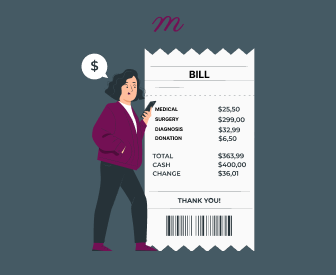Have your progress notes written for you automatically
Congrats on making your dream come true! You’re now a therapist with your very own practice. But hold on, it’s not time to put up your feet yet. You need to start making some money, and one of the best ways to do that is by getting on insurance panels. However, with so many options available, it can take time to figure out which ones are perfect for you and your practice. But don’t worry, we’ve got your back! We will take you on a fun-filled adventure to explore the top insurance panels for therapists. You’ll find out which ones best fit your expertise, credentials, and the types of clients you want to work with. We’ll give you the scoop on each panel’s benefits and potential drawbacks and let you know how much they typically reimburse. Plus, we’ll share some insider tips on how to get on and off their lists. By the end of this journey, you’ll be well on your way to building a thriving private practice with the support of major insurance companies.
Understanding Insurance Panels for Therapists
Understanding how insurance panels work is crucial if you’re a therapist and want to work with insurance companies. Insurance panels are networks of providers that insurance companies have contracted with to give care to their members at pre-negotiated rates.
Joining insurance panels as a therapist gives you access to a vast pool of potential clients, but it also has downsides. Insurance companies tend to reimburse at lower rates, which is a significant downside. You must qualify to join an insurance panel, which usually requires meeting specific credentialing criteria. This requirement includes proper licenses or certifications, minimum experience, and professional liability insurance.
The application process may take three to six months, and you must provide proof of education, licensure, insurance, and other documentation. Once you join a panel, insurance companies will direct members to you for treatment and handle billing and claims processing.
The rates are frequently non-negotiable and are set by the insurance company depending on their fee schedules. While joining insurance panels provides stability, the lower pay and administrative hassles may lead therapists to limit the number of panels they join or choose to go off insurance panels altogether in favor of privately paid clients.
The Best Insurance Panels for Therapists
If you’re a therapist looking to grow your practice, signing up with insurance companies is crucial. The key to succeeding with insurance panels is to find the ones that best fit your credentials, experience, treatment approaches, and client base. Research reimbursement rates and billing procedures, and don’t hesitate to make changes if necessary to serve your clients better. The most important thing is to build a sustainable practice that allows you to focus on what matters most: your client’s well-being.
The major players are worth considering:
Blue Cross Blue Shield (BCBS)
BCBS is one of the biggest insurance providers, so becoming a participating provider opens you up to a vast pool of potential clients. The application process can take a while, but acceptance rates are high for properly credentialed therapists.
Aetna
Aetna also has an extensive network and member base. They offer fair reimbursement rates and an easy online application. Approval typically takes four to six weeks.
Cigna
Cigna focuses on employee benefits, so its members usually have good coverage for mental healthcare services. Rates are on the higher end of the spectrum. The application process is straightforward but can take two months or more.
Medicare
To serve Medicare members, you must enroll as a Medicare provider. This allows you to bill Medicare directly for services. Enrollment does come with more paperwork, but Medicare reimbursement rates are stable, and payments are reliable.
The Best Insurance Panels for Therapists in California
As a therapist in California, some of the best insurance panels to consider joining are:
Blue Shield of California
Blue Shield is one of the largest providers in the state, so accepting their insurance can open you up to many new clients. They offer fair reimbursement rates for therapists and a relatively easy credentialing process.
Cigna
Cigna is another major insurer that provides coverage for many Californians. They are known for prompt payment and competitive rates for therapists. Cigna utilizes a streamlined credentialing system, so getting set up to accept their insurance typically only takes a few weeks.
Aetna
Aetna is one of the largest health insurers in the U.S. and provides coverage to millions of Californians. While their credentialing process can take four to six weeks, Aetna is known for giving reasonable reimbursement rates for therapists. They offer a variety of plans, including HMO, PPO, and EPO options.
Magellan Health
Magellan Health specializes in managing mental health and substance abuse benefits. They cover many employer-sponsored, Medicaid, and Medicare plans in California. Magellan is known for fast credentialing, on-time claim payments, and competitive reimbursement rates. Accepting Magellan can be an excellent way for therapists to build their caseload.
Beacon Health Options
Beacon Health Options is another major managed behavioral health organization in California. They work mental health and substance abuse benefits for many commercial, government-funded, and nonprofit health plans. Beacon offers therapists reasonable reimbursement rates, prompt payment, and a streamlined credentialing process. Accepting Beacon insurance is an excellent way for therapists to expand their reach.
How to Get On and Off Insurance Panels
Getting on insurance panels to build your practice is paramount as a therapist. Insurance companies contract with therapists to provide services to their members at an agreed-upon rate. To get on insurance panels, you must fulfill the companies’ requirements and complete their credentialing process. This generally involves submitting an application, providing references, and undergoing a background check to verify your license and education.
Once approved, the insurance company will add you to their provider list, making it easier for members to find and choose you. The companies will also set the rates for each service and pay you directly. Insurance panels are a reliable source of clients and income for many therapists. However, remember that the companies require a lot of paperwork, and the rates may be lower than your typical fee. Here are some tips to help you get on insurance panels:
- Check with major insurance companies in your area, like Blue Cross Blue Shield, Cigna, or Aetna, and see what credentials they require. Often, a master’s degree, license, and liability insurance will suffice.
- Ask colleagues for references and recommendations to include with applications.
- Be prepared for a background check. Disclose any issues upfront and be ready to discuss them.
- Negotiate the best rates you can. Companies may be open to negotiating, especially if they need providers in your expertise.
You must usually provide written notice at least 30 to 90 days before getting off an insurance panel. It’s important to notify any clients who rely on that insurance so they have time to find another provider. While leaving insurance panels can free you from their rules and rates, it may also affect your caseload and income in the short term. It’s crucial to weigh the benefits of leaving specific panels against these potential consequences. With some research, you can find insurance panels that suit your needs and help you build a successful practice. However, you don’t have to feel locked in – making changes and finding the right balance is always possible.
Does Insurance Pay for Therapists? How Much?
Finding ways to get paid for your services is essential as a therapist. Joining insurance panels may be necessary for many therapists, as it allows you to bill major insurance companies. However, it’s vital to understand how much insurance companies will pay you for your therapy services.
The amount insurance pays therapists, known as reimbursement rates, can vary quite a bit based on:
- The insurance company: Some companies like Blue Cross Blue Shield and Aetna typically offer higher reimbursement rates than others. Medicare and Medicaid, government programs, usually pay on the lower end of the spectrum.
- Your credentials and experience: Therapists with more advanced degrees, licenses, and years of experience often qualify for higher rates. For example, a licensed psychologist may receive a higher rate than a counselor.
- The services provided: Reimbursement rates vary for initial evaluations, individual therapy sessions, group therapy, etc. More specialized services tend to be reimbursed at a higher rate.
- Geographic location: Rates in large cities and affluent areas are often higher than in rural or lower-income regions. Reimbursement rates reflect the overall cost of living in your area.
As a ballpark figure, you can anticipate that insurance companies will compensate therapists between $50 to $250 per hour for most outpatient mental health services. However, the rates for some panels may be higher or lower than this range. Joining two or three of the largest insurance panels in your area and some smaller panels is a good strategy for therapists to get a good mix of referrals and pay.
How Mentalyc Can Help You Write Insurance-Compliant Progress Notes
As mental health professionals, we understand that keeping up with progress notes and insurance billing can be tedious. This is where Mentalyc comes in handy. We offer a user-friendly platform that makes administrative work much more efficient. Some of the features of our Mentalyc app are:
Automated Progress Notes
Mentalyc’s progress note generator tool is a helpful tool that allows you to generate personalized notes for each of your therapy sessions. With just a few clicks, you can select from a list of common interventions, modalities used, and topics discussed. Mentalyc then automatically compiles this information into a well-written progress note that follows insurance guidelines, so you don’t have to worry about the paperwork.
Compliance Checks
Before finalizing a note, Mentalyc double-checks that all insurance requirements are met. This includes things like:
- ensuring the note contains the client’s diagnosis and symptoms
- listing the type and duration of treatment
- documenting the client’s progress and response to treatment
- obtaining the client’s signature for verification
Built-in Billing
Mentalyc offers tools that simplify your billing and reimbursement process. You can quickly generate insurance claims by clicking a button that pulls details from your progress notes. Mentalyc also double-checks the claim to ensure that all information is accurate before submitting it to insurance companies on your behalf.
FAQ: Your Top Questions About Insurance for Therapists Answered
Do insurance companies pay for therapy sessions?
Yes, many major insurance plans cover mental health services like therapy. The amount of coverage can vary, but most offer at least some reimbursement. The key is to check with the insurance providers you’re interested in accepting to determine coverage details.
Does insurance pay therapists well?
Some need more than insurance reimbursement to provide a living wage. However, insurance panels remain an essential source of referrals and revenue for most therapists. With persistence, you can find insurance panels that reimburse you fairly while allowing you to maintain a sustainable practice.
How do I terminate insurance contracts as a therapist?
You must formally notify the carrier if you wish to leave an insurance panel. Send a letter, typically 30 to 90 days in advance, stating your intent to terminate your in-network provider agreement on a specified date. Be sure to notify any clients who use that insurance so they understand their options in the future. You may need to continue some authorizations or provide transition assistance shortly after leaving the network.
The Bottom Line
With the right mindset, insurance panels can be a thrilling adventure of growth and self-empowerment for therapists. By thoughtfully selecting the ideal panels for your practice and clients, you hold the power to establish a flourishing practice that serves your community and aids more people than you ever dreamed of. You can unleash the full potential of your insurance success and achieve your aspirations as a therapist through research, determination, and devotion to meeting client needs. Remember, while the journey may be arduous, perseverance and unwavering commitment can surmount any obstacle and emerge even stronger.
Join Mentalyc today to further optimize your practice. With Mentalyc’s fully HIPAA-compliant automated notes, you’ll save valuable time, improve care, and ensure compliance with comprehensive, legally sound records. With Mentalyc by your side, you’ll have more time to focus on the human aspect of therapy – assisting clients in attaining their goals and living more fulfilling lives. Sign up with Mentalyc now and simplify your note-taking process while upholding the highest standards of care.
Resources:
- California Reimbursement Rates for Therapy and Mental Health Providers [2023]. (n.d.). TheraThink.com. https://therathink.com/california-reimbursement-rates/
- De Ridder, Ph.D, Y. (n.d.). Mental Health and Insurance Coverage? Your FAQs Answered. Loving Life Today. https://www.lovinglifetoday.com/mental-health-insurance-questions/
- Dughi, P. (2023, August 22). Insurance for Therapists. Berxi. https://www.berxi.com/resources/articles/insurance-for-therapists/
- Insurance Reimbursement Rates for Psychotherapy [2023]. (2023). TheraThink.com. https://therathink.com/insurance-reimbursement-rates-for-psychotherapy/#medicare-reimbursement-rates
- Katoff, J. (n.d.). Psychotherapy Insurance Panels: The Good and Bad of Being In-Network. Psyched in San Francisco. http://www.psychedinsanfrancisco.com/psychotherapy-insurance-panels-good-bad-network/
- Suttle, T. (n.d.). How to End Your Relationship with Insurance | Managed Care. Private Practice From the Inside Out. https://tamarasuttle.com/how-to-end-your-relationship-with-insurance-panels-2/
Disclaimer
All examples of mental health documentation are fictional and for informational purposes only.










